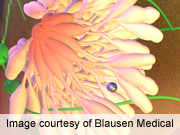New research finds biological differences in tumor type, behavior
WEDNESDAY, Jan. 14, 2015 (HealthDay News) — The chances of being diagnosed with early breast cancer, as well as surviving it, vary greatly depending on race and ethnicity, according to a new study published Jan. 13 in the Journal of the American Medical Association.
Steven Narod, M.D., research chair in breast cancer and a professor of public health at the University of Toronto, and colleagues studied 373,563 women who were diagnosed with invasive breast cancer between 2004 and 2011. The women were followed for about three years. The researchers divided the women into eight racial or ethnic groups and looked at the types of tumors, how aggressive the tumors were, and whether they had spread.
During the study period, Japanese women were more likely to be diagnosed at stage 1 than white women were, with 56.1 percent of Japanese women finding out they had cancer early, compared to 50.8 percent of white women. But only 37.0 percent of black women and 40.4 percent of South Asian women got an early diagnosis. When the researchers calculated the seven-year risk of death, black women had the highest risk, with a 6.2 percent death rate. South Asian women (Asian Indian, Pakistani) had the lowest, at 1.7 percent. And black women were nearly twice as likely as white women to die following the diagnosis of small tumors.
The new research “makes significant strides in explaining the well-known racial disparities in breast cancer,” Bobby Daly, M.D., a hematology-oncology fellow at the University of Chicago Medical Center, told HealthDay. He coauthored an editorial that accompanied the study. “It makes strides in showing how the difference in survival may reflect intrinsic differences in the biology of the tumor,” he added.
Copyright © 2015 HealthDay. All rights reserved.








